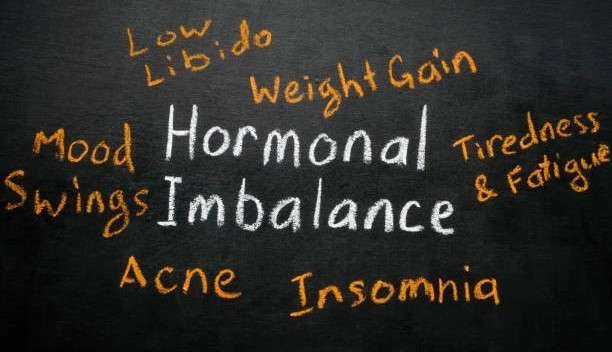
If you suspect a Hormonal Imbalance, you’re not alone — many people experience weight changes, irregular periods, low energy, mood swings or sleep problems because hormones are out of sync. This Ayurvedic guide explains the problem, common causes, practical home remedies, targeted herbs and when to get professional help. Use these steps safely and consult an expert for a personalised plan.
The problem
Hormonal Imbalance means your endocrine system (thyroid, adrenal, ovarian/testicular hormones, insulin, etc.) is not working in harmony. The immediate problem is symptoms — irregular cycles, fatigue, weight gain, acne, poor libido, sleep disturbance and mood changes. The deeper problem may be poor digestion (low Agni), chronic stress, toxin build-up (ama) or lifestyle patterns that disturb metabolic and reproductive hormones. Ayurveda treats the root cause by restoring digestion, balancing doshas and strengthening ojas (vitality).
Why hormones get out of balance (common causes)
- Stress and high cortisol: Chronic stress raises cortisol which disrupts sex and thyroid hormones.
- Poor sleep & circadian disruption: Irregular sleep harms insulin and melatonin balance.
- Diet & obesity: High processed foods, sugar and excess body fat worsen insulin resistance and steroid hormone imbalance.
- Thyroid dysfunction: Hypo- or hyperthyroidism affects metabolism and reproductive hormones.
- PCOS / PCOD: Insulin resistance and androgen excess cause menstrual and fertility problems.
- Aging and perimenopause/andropause: Natural hormone shifts during life stages.
- Medications & toxins: Some drugs and environmental chemicals can interfere with endocrine function.
- Gut health & digestion: Poor digestion (ama) reduces nutrient absorption and harms hormonal regulation.
Symptoms to watch for
- Irregular or heavy periods, missed cycles (in women).
- Persistent fatigue, low libido, erectile problems (in men).
- Unexplained weight gain or difficulty losing weight.
- Hair thinning, acne, excessive facial/body hair.
- Mood swings, anxiety or depression.
- Insomnia or daytime sleepiness.
If several of these persist for weeks, test and evaluation are recommended.
Ayurvedic approach to Hormonal Imbalance
Ayurveda aims to restore balance by:
- Strengthening Agni (digestion) to clear ama.
- Balancing doshas — often calming Vata, reducing Kapha, or cooling excess Pitta depending on the person.
- Nourishing ojas with rasayanas (rejuvenatives) and a sattvic diet.
- Using targeted herbs, lifestyle routines (dinacharya), yoga and pranayama to stabilise endocrine function.
10 Practical Ayurvedic remedies for Hormonal Imbalance
1) Improve digestion first
Why: Good digestion prevents ama, improves nutrient uptake and supports hormone synthesis.
How: Eat warm, cooked meals; use digestive spices (jeera, hing, ginger) and avoid cold/raw heavy foods.
2) Regular sleep & circadian routine
Why: Consistent sleep supports melatonin and cortisol rhythm.
How: Sleep 7–8 hours, go to bed and wake at consistent times, get morning sunlight.
3) Stress management — daily breathwork & short meditation
Why: Lowers cortisol which helps restore sex and thyroid hormones.
How: Practice 5–10 minutes of Anulom Vilom and Bhramari daily.
4) Balanced, low-glycaemic diet — control insulin & weight
Why: Stable blood sugar reduces insulin-driven androgen excess (important in PCOS) and supports thyroid health.
How: Focus on whole grains, legumes, vegetables, healthy fats and lean proteins. Limit refined carbs and sugary drinks.
5) Ayurvedic herbs & rasayanas (use under guidance)
Why: Specific herbs support endocrine function and vitality.
Which herbs: Ashwagandha (stress & thyroid support), Shatavari (female reproductive support), Gokshura / Gokshura (male reproductive support), Guduchi (Giloy) (metabolic balance), Triphala for digestion. Always consult an Ayurvedic practitioner for personalised formulations.
6) Gentle daily oil massage (Abhyanga)
Why: Calms Vata and improves circulation to endocrine tissues.
How: Warm sesame or almond oil, 5–10 minutes, then shower. Do 3–4 times weekly.
7) Yoga poses for hormonal balance
Why: Certain asanas enhance pelvic and endocrine circulation.
How: Practice Bhujangasana, Setu Bandhasana, Baddha Konasana and gentle twists regularly.
8) Maintain healthy body weight & move daily
Why: Body fat influences estrogen and insulin. Movement improves insulin sensitivity.
How: Aim for 30 min moderate activity most days and include resistance training twice weekly.
9) Avoid endocrine disruptors & manage medication risks
Why: Plastics, certain pesticides and chemicals can mimic hormones.
How: Use glass or steel for food storage, reduce processed cosmetics and discuss medication side effects with your doctor.
10) Targeted testing & integrated care
Why: Treating blindly can miss conditions like thyroid disease, PCOS, adrenal dysfunction or hypogonadism.
How: Get basic tests (TSH, fasting glucose/HbA1c, sex hormones, cortisol if indicated). Combine Ayurvedic care with medical evaluation.

Practical 3-month plan
First Month : Stabilise sleep, warm-cooked low-GI diet, warm water mornings, start gentle walks.
Second Month : Add daily pranayama, Abhyanga twice weekly and an Ayurvedic herb (after practitioner consult).
Third Month : Reassess symptoms and tests; consider personalised rasayana or Panchakarma if recommended.
Safety & evidence notes
- Many herbs show supportive data for stress, thyroid or metabolic health, but they should be taken under supervision — especially if you’re on thyroid, diabetes, hormonal or psychiatric medications.
- Do not stop prescribed endocrine medicines without medical advice.
- Pregnancy, breastfeeding and serious medical conditions require specialist oversight.
When to get a consultation
If you have persistent irregular periods, sudden weight change, severe fatigue, signs of thyroid dysfunction, difficulty conceiving, or symptoms that interfere with daily life — seek professional help. For a personalised Hormonal Imbalance assessment and an integrated Ayurvedic treatment plan (tests review, herbs, diet, and follow-up), get a consultation from Vedic Upchar:
👉 https://vedicupchar.com/doctor-consultation
A practitioner will test, tailor herbs (e.g., Ashwagandha, Shatavari), advise diet and recommend safe therapies such as panchakarma when appropriate.
Quick daily checklist to start restoring hormone balance
- Warm water on waking and a light walk.
- Regular meals with digestive spices.
- 5–10 min pranayama mid-morning.
- Abhyanga 3× weekly and 7–8 hours of sleep.
- Avoid processed foods, plastics for food storage and late-night screens.